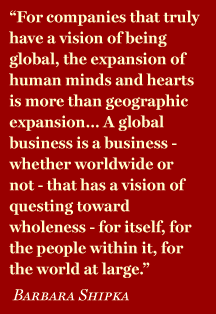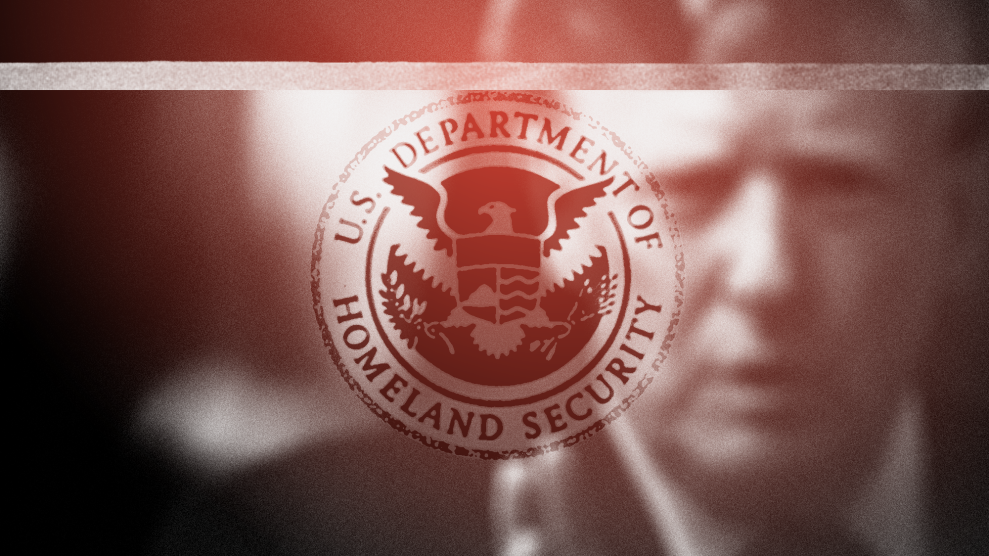Beggar my neighbor
In a global market, where multinational corporations compete on price and cost cutting, the cheapest places on earth for natural resources or labor are precisely those nations which place no value on democracy, human rights or environmental protection.
Take Burma for example, ruled by one of the most repressive and barbaric regimes anywhere in the world — which have ignored free democratic elections and imprisoned the victor, the heroic Aung San Suu Kyi. Yet what is a human rights disaster for its citizens is regarded as an investment opportunity by the big energy corporations. The Unocal Corporation of California and the French oil company Total have formed a joint venture with the military dictators of Burma to extract gas from under the sea, some 40 miles off the coast. To make sure the pipeline keeps pumping revenue back into Burma for its cash-starved regime, the military has destroyed entire villages, seized property and attacked, raped and tortured innocent villagers, many of whom have been forced to labor as slaves on the pipeline. Of course that may not be what the oil companies want, but they need to understand the consequences of doing business with a dictatorship.
Unfree trade
I isn’t just oil, and it’s not just Burma. The principle of ‘free’ trade applies to every other product or commodity, no matter how low wages are driven, how spoiled the environment, and how crushed the rights of workers. There is always some place in the world a little worse off, a little riper for exploitation.
 |
The ‘free market’ conjures up fuzzy notions of free and equal individuals exchanging hand-made shoes for homegrown geese in a village square. This bucolic picture carries with it a notion that a job is just an individual contract between equals — but it hasn’t been like that. Colin Hines from the International Forum on Globalization reports that since NAFTA, around 2,000 factories have moved from the USA to operate in the border region in Mexico, virtually unhindered by lax environmental and labor regulations. NAFTA is the North American Free Trade Agreement — or, as some campaigners put it, Not Another Fucking Trade Association — and it has relaxed regulations to a dangerous extent. The environmental repercussions of more than 300 companies opening up works on the Mexican border with Texas are appalling. As many as 400,000 people live there without sufficient housing, running water, sewerage, pavements or electricity. An open canal carries 55 million gallons of raw sewage for 17 miles, alongside the Rio Grande, polluting drinking water wells and the river itself.
Free trade is one of the greatest deceptions. Ask yourself whether the market is really free, and free for whom or for what. The truth is that free trade was originally about the freedom of communities to trade equally with each other. It was never intended to be what it is today – a licence for the big, the powerful and the rich to ride roughshod over people who have no choice about whether they trade or not.
Blind world government
The problem is that we have a world trading system that is blind to this kind of injustice, presided over by the World Trade Organization, the ubiquitous WTO. As the powers of governments shrink, this system acts as our new unelected, uncontrollable world government. The WTO, and the group of unelected trade officials who run it, is now effectively the world’s highest court, with the right to overturn local laws or safety regulations wherever they say it interferes with free trade.
The world trading system is world government by default and it is also blind government. It looks at the bottom line, but can’t see anything else. It can recognize profits and losses, but it deliberately turns its face away from human rights, child labor, or keeping the environment viable for future generations. It is government without a heart, and without a heart you find the creativity of the human spirit starts to dwindle too.
I believe those who are now in control — the economic governments, politicians and business people — are capable of driving us over the edge. Global planning institutions like the WTO, World Bank and the IMF are ignoring mounting evidence of an impending social catastrophe that will leave widespread, dangerous inequality and insecurity. These institutions are simply not working for the majority of humanity. The danger is that the current trading system undermines anyone who tries to do what we are doing. Businesses which forgo profits to build communities, or which keep production local rather than employing semi-slaves in distant sweatshops, risk losing business to cheaper competitors without such commitments and being target for take-over by the slash-and-burn corporate raiders.
The soulless destruction of monoculture
I am often asked what I fear most about the way business is going. My biggest fear is seeing not just the planet’s business, but also the planet, being controlled by a handful of gigantic transnational corporations. You can see the beginning of this in the way the global brands are starting to raise our children. They entertain them, feed them, clothe them, medicate them, addict them, and define the ways in which they relate to each other. By the time they are seven, the average American child will be seeing 20,000 advertisements a year on television. By the time they are 12, they will have an entry in the massive marketing databases used by companies.
There is a soulless kind of destruction that this kind of global monoculture wreaks. Not just on families, but on family farms. It means the proliferation of one-crop nations in a country like Africa, with the whole crop being produced for export. It means millions of people no longer able to look to their land to supply their basic food needs. This is the big conundrum of the global market. People believe this kind of market economy will raise people to a level of consumer benefit — so much so that they will abandon their homes and villages and crowd into the cities in search of money wealth — and it just isn’t working.
With fewer and fewer corporations controlling more and more of the world’s trade, there is an ever greater need to know more about the practices of these large, faceless organizations. Redress is very slow — there is still no compensation for the thousands of victims of Union Carbide in Bhopal, or for the Ogoni in Nigeria, or for countless other voiceless and powerless victims trampled underfoot to accumulate ever increasing profits. But consumers are beginning to resist and some of us are looking for a better way.
Seattle diary: Saturday, Nov. 27, 1999: I am here for the Teach-In, organised by the International Forum on Globalization — an alliance of some 60 economists, activists, scholars and non-profit organizations from more than 20 countries, based in San Francisco. The event is about the implications of economic globalization and the role of the WTO, and it is absolutely spectacular. Every meeting is packed to capacity and hundreds of people hang around outside a 3,000-seater auditorium begging for tickets. Inside the auditorium it is high energy, with ringing speeches condemning the multiple impacts of economic globalization and offering ways of humanizing the economy.
“We should say this to the negotiators,” I say in my speech. “You may think that only money matters, but we know differently. If you take no notice of our warnings, you will put back the progress of people and planet, but you won’t set it back forever. By putting our money where our heart is, refusing to buy the products that exploit, we will mould the world into a kinder more loving shape. And we will do so no matter what you decide this week. Progress is on our side.”
Every speaker — they include Indian physicist and activist Vandana Shiva, economist Martin Khor and Susan George — receive a standing ovation. I look around the audience and thought: these people know the truth. The thousands of trade and government officials at the WTO meeting just up the road should be here.
Back in 1993, a good six years before the extraordinary events in Seattle, I was invited to give a talk to the International Chamber of Commerce at a meeting that was to be held in Cancun. I had just returned from two weeks being with peasant farm workers in Mexico and saw for myself some of the results of callous business practices in the tobacco fields. There are places I have been around the world where capital has newly, and temporarily alighted, where I’ve held mutated babies genetically handicapped by toxic wastes dumped in local streams. But this example was particularly upsetting, looking at the new babies that were being born there without genitalia. Scientists had tracked down the cause to the pesticides used on the nearby fields.
The American tobacco companies which bought the crops grown there refused to accept any responsibility because the fields did not belong to them. And knowing that representatives of the same companies were going to be in the audience in Cancun, and that this kind of corporate indifference was endemic among the people I would be speaking to, I did a talk about the key issue of the moment — NAFTA. And I showed them the slides of my journey with the Huichol Indians in the Sierra Madre.
I don’t quite know what response I expected. I thought there would be some reaction, even if they howled me off the stage. But there was absolutely none — no embarrassment, no sense of outrage, just a collegial sense of good manners.
I was chilled by the experience because these were no ordinary people. Leaders in world business are the first true global citizens. We have worldwide capability and responsibility; our domains transcend national boundaries. Our decisions affect not just economies but societies; not just the direct concerns of business, but world problems of poverty, environment and security. Yet if business comes with no moral sympathy or honorable code of behavior, then God help us all.
I don’t think anyone would argue that business now dominates the world’s center stage. It is faster, more creative, more adaptable, efficient and wealthier than many governments. Microsoft could fund the National Health Service, the Royal Navy, the RAF and the Army for a year and still have change to spare, all by itself. Only 27 countries have a turnover greater than the combined sales of Shell and Exxon. Half of everything spent by British consumers goes into the coffers of just 250 companies. So in terms of power and influence, you can forget the church and forget politics too. There is no more powerful institution in society than business. So it is more important than ever before for business to assume a moral leadership in society.
The trouble is that many of our business leaders are not equipped to deal with this new responsibility. For one thing, they are locked into the narrow economic thinking of the past — our modern age is unique in the way economics over-rides everything of value. The prevailing view of trade is a version of globalization that could be described as commerce without conscience. And conscience is a key to the way out.
Businesses have become hypnotised by the bottom line, losing sight of their moral obligations to civil society. The message I have been repeating in every speech I’ve made and every article I’ve written on business in the last 15 years is that we must include in our measures of success enough to sustain communities, cultures and families, and the consequences will be severe unless we do so. The conscience is partly that of business itself, partly their customers and the public, and partly a matter of simple regulation.
Change by regulation
Let’s take regulation first — because business needs a strong framework to thrive. Without that legal framework and constraints, there will always be a tendency for it to become criminal. You will now find that’s why the second largest employer in the world is now the illegal drugs industry, and one of the biggest sectors of economic growth is child sex. We need business to be accountable and to base its international behavior on the charters and treaties on sustainability and human rights – so happily signed by governments the world over, but so easily ignored by them. Regulation has to penalize them when they break the rules.
“Goods produced under conditions which do not meet a rudimentary standard of decency, should be regarded as contraband and ought not to be allowed to pollute channels of interstate trade.” Roosevelt’s quote is more valid than ever today. And as globalization ties the world together more tightly activities that are unaccountable and illegal are paradoxically increasing.
















